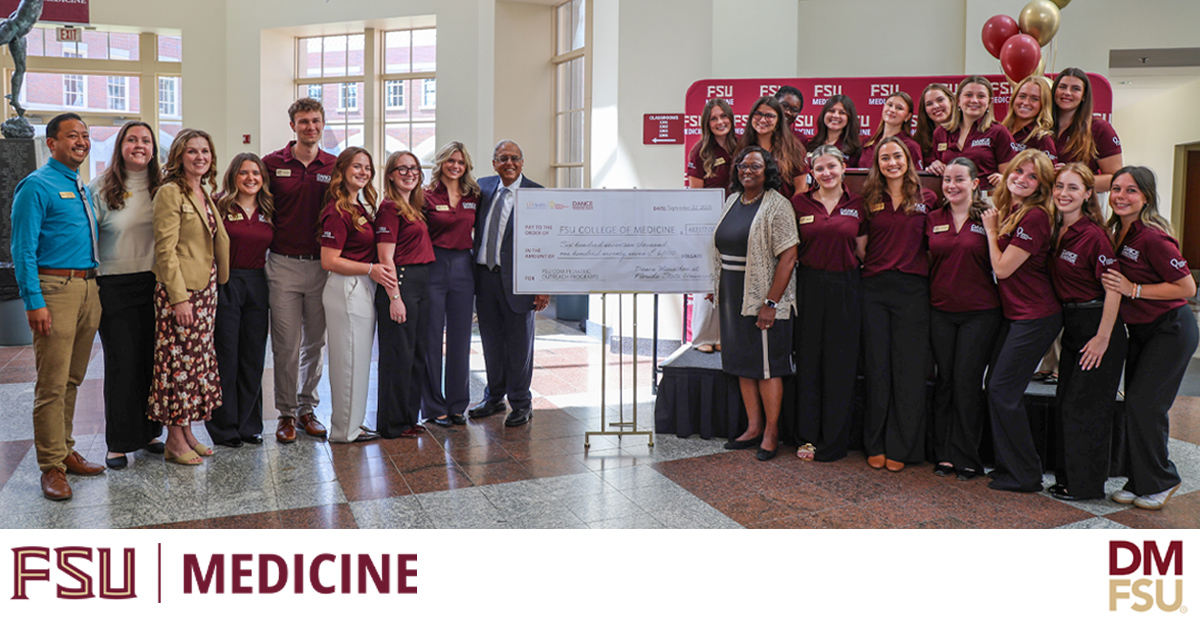
Every year, Dance Marathon at Florida State University supports health care programs in Florida, including at UF Health’s Shands Children’s Hospital and closer to home in Leon County.
This year, that support reached a milestone: more than $10 million in funding to the FSU College of Medicine since 2003.
Alma B. Littles, M.D., dean of the College of Medicine, took to the stage at this year’s check presentation to celebrate the impact that student volunteers have made since the marathon’s founding.
“Here are a couple of things you may not know,” Littles said. “Dance Marathon at FSU proudly stands as one of the five founding Miracle Network Dance Marathons in the country and consistently ranks among the top five Miracle Network Marathon programs nationwide. This is impressive!”
Dance Marathon at Florida State University, or DM at FSU, was first held in 1996 under the umbrella of the Children’s Miracle Network. Initially, all the money raised went to UF Health Shands Children’s Hospital. The FSU College of Medicine was added as a recipient in 2003.
Each year, half the money raised at FSU, after expenses are paid, is given to the College of Medicine to support pediatric health care. Of the $1.3 million raised this year, $617,177.06 went to the FSU College of Medicine, bringing the total over the years to more than $10.3 million.
Dozens of FSU students commit an entire year of fundraising and planning, which culminates in a whirlwind weekend of non-stop dancing in March during which thousands of students dance in 10- or 20-hour shifts. Many students get involved in Dance Marathon early in their college careers, working their way up into ever-increasing areas of responsibility each year.
“DM at FSU is where new leaders discover their passion, first found where our future is built, and where many of us, myself included, first found our place in this movement,” said Grace Massari, executive director of the 2026 Dance Marathon.
Among the community partnerships in pediatric health care funded by DM at FSU are FSU Primary Health, a clinic in southwest Tallahassee that added health care resources to an underserved area; Big Bend Hospice’s free grief counseling for children; FSU Institute for Infant and Child Medical Music Therapy, which works in the neo-natal intensive care unit at Tallahassee Memorial HealthCare; FSU Early Head Start and the Gadsden School-Based Rural Health Clinics, a collaboration among the College of Medicine, Gadsden County Department of Health and Gadsden County Schools.
Juliana Olodude, lead specialist in the Outreach and Enrollment Department at the Bond Community Health Center, said Dance Marathon support enabled Bond to expand its mobile health services and take its dental programs on the road.
“When you meet people where they are, you often have to show them that the care is real and accessible,” she said. “Having a mobile unit that is equipped like a doctor’s or dentist’s office reinforces that this is serious, quality care. It helps people feel worthy of receiving the health care they may not have had access to before.”
This year, the College of Medicine fielded its own dance team for the first time in over a decade, although its students have raised money every year since it was named a beneficiary.
Littles recognized the six dancers — Kaitlyn Barnes, Alexandra Bush, David Hartsfield, Canna Liu, Kieu Tran and Victoria Vida — who were all first-year medical students when they participated in the main event back in March. Now second-year medical students with an even tougher curriculum, they will serve as advisors to the team of first-year students planning the upcoming marathon.
Rashim Savani, M.D., chair of the University of Florida College of Medicine’s Department of Pediatrics and the physician-in-chief at Shands, emphasized how much the dancers’ efforts change the lives of children in the region facing health challenges. He gave examples of how research funded by Dance Marathon helped UF develop an antibody to Type 1 diabetes that is given to patients who are prediabetic. Twelve patients have already received the antibody.
“If you don’t know what Type 1 diabetes is, it’s a failure of your pancreas to make insulin, so then you are a lifelong dependent on insulin pumps, (finger) sticks all the time, complications like blindness, inability to walk, losing the feeling in your extremities; it’s horrible,” he said. “You give one shot of this antibody, and you can either delay the onset of Type 1 diabetes, or in some cases, you can actually prevent it completely. You give that.”
He also shared that UF is making progress against certain childhood tumors that have been resistant to treatment for 40 years.
“Solid brain tumors in children is a devastating disorder,” Savani said. “It’s high mortality, and no matter what we tried, the tumor evaded our immune system.” But a team has developed an immunotherapy that dissolved the tumors in animal testing.
“I’m pleased to report that we’ve now treated our first four patients with this technology,” he said. “You made that happen. You did that.”
news.fsu.edu/news/health-medicine/2025/09/30/dancing-for-a-cause-dance-marathon-at-florida-state-university-tops-10-million-in-total-support-for-fsu-college-of-medicine-since-2003/”>Source link

